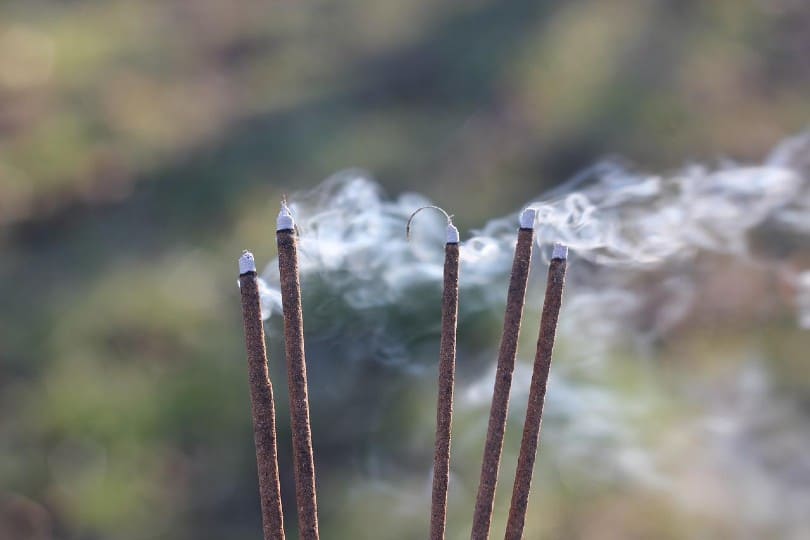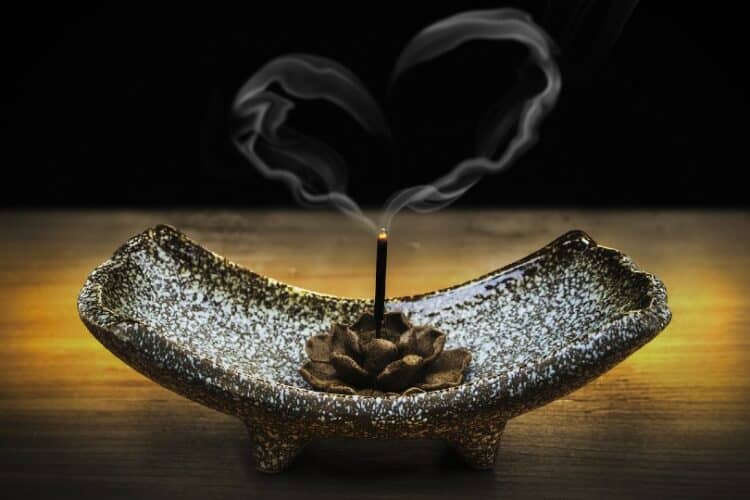If you enjoy using scented products to unwind, you may be wondering if these are safe for your cats to be around. Though scented candles, essential oils, and incense can do wonders for helping us destress after a long day, unfortunately, they can be stressful to your cat’s respiratory system.
Cats have sensitive respiratory systems and the smoke diffused by scented products like incense can be toxic to them. To put this into perspective, cats have more than 200 million odor sensors compared to a human’s 5 million.
This doesn’t mean that you have to clear out your home of all scented products—it just means that if you do use them, you should be aware of the potential health hazards and use them in a way that minimizes the risk to your cats.
Incense
Incense can be harmful to cats because it gives off smoke, something cats are very sensitive to. Smoke can aggravate existing conditions like asthma and cause other respiratory health issues to develop. For this reason, it’s best to avoid using incense. If you use it for religious or meditative purposes, keep your cat in another room and ventilate the area well during and after use.
If your cat has eaten incense or has breathed in its fumes and is showing symptoms like coughing, gagging, or wheezing, contact your vet straight away.
Incense Alternatives
If you’re ready to throw out the incense because you’re worried for your cat’s health, there are some safe alternatives you can try instead to leave a pleasant scent or purify the air in your home. Febreze, for one, has been declared safe by the ASPCA—when used correctly, of course.
You could also try using an air purifier to help remove odor-causing particles and allergens from the air. Though this won’t add a scent to your environment, it’s a good way to prevent bad odors from developing.

What About Other Scented Products?
Now that we know incense can be harmful to cats, what about other scented products like scented candles and essential oils? Let’s break it down.
Essential oils
Like incense, many essential oils are toxic to cats when breathed in or ingested because cats lack the enzyme necessary to eliminate essential oil toxins from their systems. Some of these include:
- Tea tree oil
- Cinnamon oil
- Peppermint oil
- Ylang Ylang oil
- Eucalyptus oil
- Pennyroyal oil
- Clove oil
- Oil of wintergreen
- Citrus oil
- Oil of sweet birch
- Pine oil
If a cat breathes in essential oil fragrances, they may experience respiratory irritation in the form of watery eyes, nausea, burning in the throat and nose, drooling, vomiting, and breathing issues. Evidence of breathing difficulties includes coughing, wheezing, panting, and labored or fast breathing. If these symptoms occur in your cat, move them immediately to an area with fresh air and contact your vet.
If your cat ingests essential oil or gets it on their skin, they should also be seen by a vet immediately. Symptoms of essential oil poisoning include drooling, wobbliness, tremors, vomiting, liver failure, and a low heart rate and body temperature. If you do use essential oils for aromatherapy, keep them well away from your cat, both in concentrated and diluted form.
Scented Candles
Some scented candles can be harmful to cats, and this depends on the type of wax. Vegetable-based wax, soy wax, and beeswax are the safest types of candle wax. Paraffin is more likely to cause a problem due to it being derived from petroleum. When burning, paraffin candles release toxins that could cause respiratory issues.
If you regularly burn candles in your home, make sure the area is well-ventilated to minimize the risk of health issues arising. Be extra cautious if your cat has been diagnosed with a pre-existing respiratory issue.

Potpourri
Potpourri comes in a few forms—dry, oil, and liquid. It’s difficult to determine exactly which plants make up different types of potpourri and so it’s best to treat them all with caution. Potpourri can cause respiratory irritation if breathed in and esophageal and/or gastrointestinal issues if consumed—these include eye or skin burns, ulcers in the digestive tract, and breathing issues.
Signs of potpourri poisoning include gagging, breathing difficulties, drooling, dehydration, and lethargy amongst others. If you use potpourri in your home, be sure to keep it out of your cat’s reach. Clear up any liquid potpourri spills quickly to avoid your cat getting it on their paws or fur.
Final Thoughts
To sum it up, it appears unanimous that incense and other scented products such as essential oils, candles, and potpourri can pose some serious health risks to cats. If you use any of these products, we recommend exercising caution. This means placing potential toxins out of your cat’s reach, keeping your cat away from the usage area, and ventilating your home well.
Featured Image Credit: Pixabay














